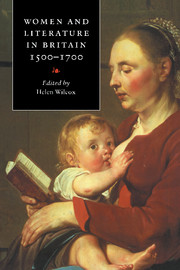Book contents
- Frontmatter
- Contents
- List of contributors
- Acknowledgements
- A note on references
- Chronology: women and literature in Britain, 1500–1700
- Introduction
- Part I CONSTRUCTING WOMEN IN EARLY MODERN BRITAIN
- Part II WRITING WOMEN IN EARLY MODERN BRITAIN
- Chapter 7 Renaissance concepts of the ‘woman writer’
- Chapter 8 Courtly writing by women
- Chapter 9 Women's poetry in early modern Britain
- Chapter 10 Women's writing and the self
- Chapter 11 The possibilities of prose
- Chapter 12 The first female dramatists
- Further reading
- Index
Chapter 8 - Courtly writing by women
Published online by Cambridge University Press: 22 September 2009
- Frontmatter
- Contents
- List of contributors
- Acknowledgements
- A note on references
- Chronology: women and literature in Britain, 1500–1700
- Introduction
- Part I CONSTRUCTING WOMEN IN EARLY MODERN BRITAIN
- Part II WRITING WOMEN IN EARLY MODERN BRITAIN
- Chapter 7 Renaissance concepts of the ‘woman writer’
- Chapter 8 Courtly writing by women
- Chapter 9 Women's poetry in early modern Britain
- Chapter 10 Women's writing and the self
- Chapter 11 The possibilities of prose
- Chapter 12 The first female dramatists
- Further reading
- Index
Summary
In this strang[e] labourinth how shall I turne?
Mary Wroth, ‘A Crowne of Sonetts dedicated to Love’‘Courtly writing’ is a phrase with literary–generic as well as social connotations. The modern phrase ‘courtly love’ refers to mediaeval and Renaissance literature in which a male lover laments his desire for anunyielding mistress; a tradition which was influenced by the fourteenthcentury Italian poet Petrarch, whose lyrics expressed his love for the chaste Laura, and by neo-Platonic philosophy, which regarded unconsummated passion for a beautiful woman as spiritually elevating. Other genres also are distinctively courtly: panegyric, for instance, the poetry of praise that sought the favour of a potential patron or of the monarch, was obviously intrinsic to court life. Chivalric romance, a genre of rambling fantastic narrative concerning the adventures of knights and ladies, was set in fictional pseudo-mediaeval courts, but often reflected the culture of the real contemporary court. ‘Closet’ drama (discussed briefly at the end of this chapter and in chapter 12 of this volume) was also associated with court circles.
Several influential accounts of courtly writing might suggest that it was entirely practised by men. J. W. Saunders describes how courtier poets preferred manuscript circulation among an exclusive coterie over the ungentlemanly exposure of print publication; all his examples are male. Daniel Javitch argues that the conduct and poetry alike of male courtiers consisted in elegant dissimulation. Arthur Marotti regards the courtly poetry of unfulfilled heterosexual male desire as the metaphorical expression of frustrated political ambitions.
- Type
- Chapter
- Information
- Women and Literature in Britain, 1500–1700 , pp. 169 - 189Publisher: Cambridge University PressPrint publication year: 1996
- 6
- Cited by



